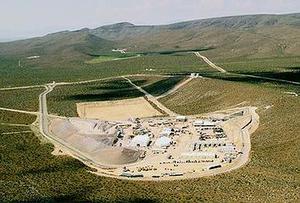Data storageYucca Mountain as a data depository
For nearly three decades, Yucca Mountain was the place designated as the country’s nuclear waste repository; after many years of study and exploration, the Obama administration, two years ago, decided not to ask for additional funds for the project; now there is another idea for the site: turning it into a giant, secure data center

Exterior of the Yucca Mountain site that could become a data repository // Source: e-info.org.tw
When Congress returns to session this week, there will be two items on the agenda which will attract great interest in Nevada: cybersecurity and Yucca Mountain.
For nearly three decades, Yucca Mountain was the place designated as the country’s nuclear waste repository. After many years of study and exploration, the Obama administration, two years ago, decided not to ask for additional funds for the project.
The Las Vegas Sun reports that off on the sidelines, away from the cameras and microphones, serious discussions have been taking place concerning alternative uses for Yucca Mountain. Because of the oddity of the congressional calendar, one of the more interesting ideas under discussion is turning what was supposed to be a nuclear waste repository into a giant data center.
Al Melquist is a software engineer and former hacker who, like many with his particular skill set, has worked for a number of federal agencies.
“There’s a small movement of people in the intelligence world who would like to turn Yucca into a giant data center,” Melquist told the Sun. “One of the biggest issues that we face as a country is an (electromagnetic) blast,” he said. “If you want to take out the United States … you just have a nuclear blast above ground and the EMFs wipe out everything … wipe out data, wipe out the ability for anybody to trace their bank accounts, and you’re done.”
Yucca Mountain has something in place to counteract such a scenario. Intended for public safety, the facility has a mesh lining which was intended to catch stray ions that might escape from a container of spent nuclear fuel. That same mesh would also keep ions out, and protect whatever was inside the mountain repository. “If you took that facility and, instead of putting containers full of nuclear waste, you turned them into data storage containers … you could store everything in there,” Melquist added. “It’s underground. It’s protected. It’s sealed.”
Add to this the agreement of the Nevada congressman most connected to the intelligence sector. Representative Joe Heck sits on the House Intelligence Committee. “There’s restricted airspace (around Yucca); it’s impenetrable underground,” Heck said. “If we could get the infrastructure out there … I believe that there is potential for that to be one of the federal government data centers.”
Last fall, Senate majority leader Harry Reid (D-Nevada) ordered the General Accounting Office (GAO) to develop a list of potential uses for the Yucca Mountain facility. The GAO surveyed a number of experts and came up with thirty suggested uses, none of which included a secure data storage center.
For his part, Nevada’s Senator Reid is apparently not ruling out any suggested uses for Yucca Mountain, so long as they do not involve radioactive spent fuel.
